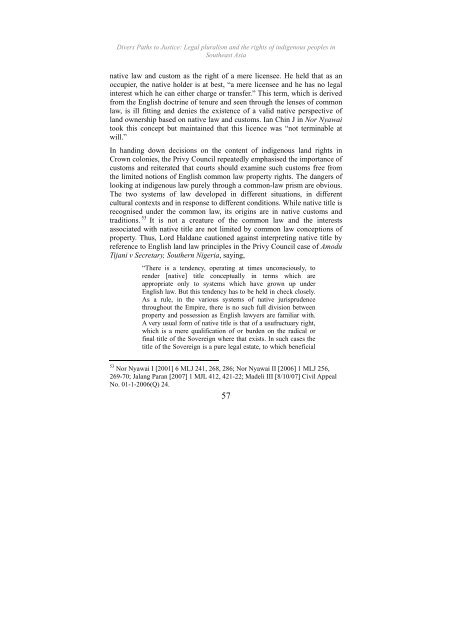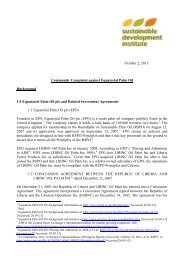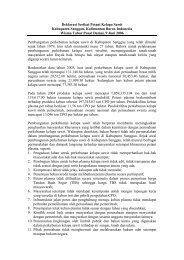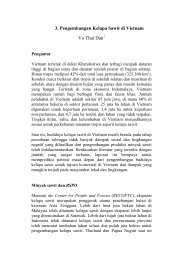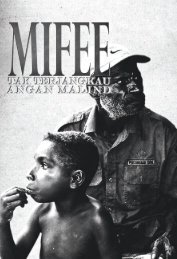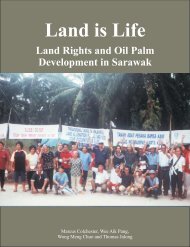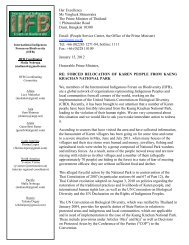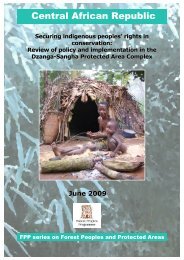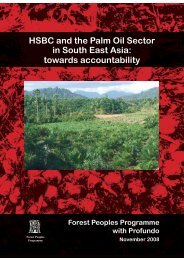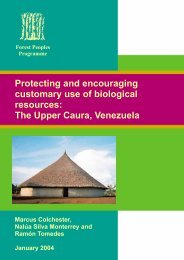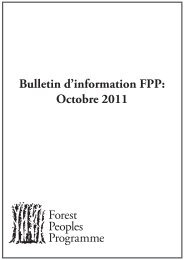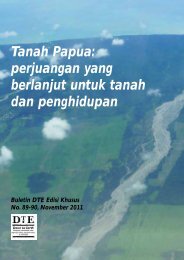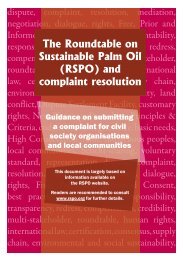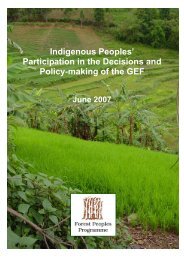Divers Paths to Justice - English - Forest Peoples Programme
Divers Paths to Justice - English - Forest Peoples Programme
Divers Paths to Justice - English - Forest Peoples Programme
You also want an ePaper? Increase the reach of your titles
YUMPU automatically turns print PDFs into web optimized ePapers that Google loves.
<strong>Divers</strong> <strong>Paths</strong> <strong>to</strong> <strong>Justice</strong>: Legal pluralism and the rights of indigenous peoples inSoutheast Asianative law and cus<strong>to</strong>m as the right of a mere licensee. He held that as anoccupier, the native holder is at best, “a mere licensee and he has no legalinterest which he can either charge or transfer.” This term, which is derivedfrom the <strong>English</strong> doctrine of tenure and seen through the lenses of commonlaw, is ill fitting and denies the existence of a valid native perspective ofland ownership based on native law and cus<strong>to</strong>ms. Ian Chin J in Nor Nyawai<strong>to</strong>ok this concept but maintained that this licence was “not terminable atwill.”In handing down decisions on the content of indigenous land rights inCrown colonies, the Privy Council repeatedly emphasised the importance ofcus<strong>to</strong>ms and reiterated that courts should examine such cus<strong>to</strong>ms free fromthe limited notions of <strong>English</strong> common law property rights. The dangers oflooking at indigenous law purely through a common-law prism are obvious.The two systems of law developed in different situations, in differentcultural contexts and in response <strong>to</strong> different conditions. While native title isrecognised under the common law, its origins are in native cus<strong>to</strong>ms andtraditions. 53 It is not a creature of the common law and the interestsassociated with native title are not limited by common law conceptions ofproperty. Thus, Lord Haldane cautioned against interpreting native title byreference <strong>to</strong> <strong>English</strong> land law principles in the Privy Council case of AmoduTijani v Secretary, Southern Nigeria, saying,“There is a tendency, operating at times unconsciously, <strong>to</strong>render [native] title conceptually in terms which areappropriate only <strong>to</strong> systems which have grown up under<strong>English</strong> law. But this tendency has <strong>to</strong> be held in check closely.As a rule, in the various systems of native jurisprudencethroughout the Empire, there is no such full division betweenproperty and possession as <strong>English</strong> lawyers are familiar with.A very usual form of native title is that of a usufructuary right,which is a mere qualification of or burden on the radical orfinal title of the Sovereign where that exists. In such cases thetitle of the Sovereign is a pure legal estate, <strong>to</strong> which beneficial53 Nor Nyawai I [2001] 6 MLJ 241, 268, 286; Nor Nyawai II [2006] 1 MLJ 256,269-70; Jalang Paran [2007] 1 MJL 412, 421-22; Madeli III [8/10/07] Civil AppealNo. 01-1-2006(Q) 24.57


